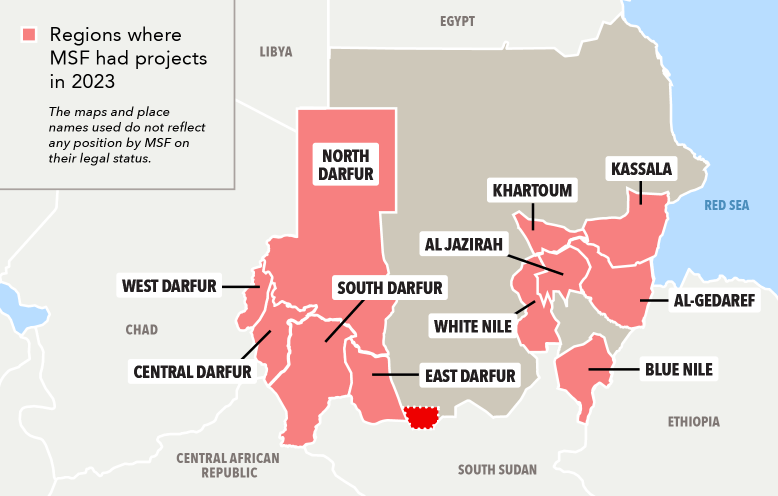In the Darfur region, where the violence has taken an ethnic dimension, most health facilities are no longer functioning due to the lack of critical supplies and medical staff. There is a widespread shortage of supplies such as vaccines, nutrition commodities, and HIV medications, as well as a poor disease surveillance system. At the same time, overcrowded and dire conditions in gathering sites and camps exacerbate the risk of disease outbreaks, while people with chronic conditions are struggling to access the care and medicines they need to survive.

Sudan 2024 © Mohamed Zakaria
Sudan
In April 2023, intense fighting broke out across Sudan, including Khartoum and the Darfur region. MSF teams are providing medical care for people affected by this latest surge of conflict and other crises.
MSF condemns a despicable attack on its ambulance in El Fasher that killed one passenger
On January 10, a clearly marked MSF ambulance was shot at in El Fasher, North Darfur, by an unknown gunman while carrying a female patient in labor, who required an emergency surgical procedure, from the MSF field hospital in Zamzam camp to the Saudi Hospital in El Fasher. A caregiver who was with the patient was struck passed away after the crew eventually reached the Saudi Hospital. This is the second shooting incident impacting an MSF ambulance in less than a month in El Fasher.
“We are horrified by this deadly attack on a humanitarian crew carrying out lifesaving medical work where it’s desperately needed,” says Michel Olivier Lacharité, MSF's head of emergency operations.
Read more
Our work in Sudan
After a bloody war erupted in Sudan in 2023, Doctors Without Borders/Médecins Sans Frontières (MSF) quickly adapted activities to respond, despite security and administrative challenges.

What's happening in Sudan?
On April 15, 2023, intense, unexpected fighting broke out between the Sudanese Armed Forces and the paramilitary Rapid Support Forces (RSF) in Sudan’s capital, Khartoum. It plunged the entire country into chaos as the violence spread nationwide, leading to tens of thousands of casualties and uprooting millions of people from their homes.
The health system, already fragile before the conflict started, is struggling to cope with existing and emerging medical needs while facing overwhelming pressure from the destruction and looting of health facilities, acute shortages of utilities and medical supplies, and under-resourced health staff who are overworked without pay. As a result, people face significant challenges accessing medical care throughout the country. By the time many are able to access care, their condition has become critical.

Sudan crisis response
How MSF is responding to urgent needs inside Sudan and in neighboring countries.

How we're helping in Sudan
From 2019, following the ousting of the former president, Omar al-Bashir, our teams had been expanding medical activities across Sudan amid a volatile transition, working in 11 states. The country already had large pockets of displaced people as well as refugees from neighboring countries. When the war began, we refocused our response to try to meet the needs of those affected.
The MSF-supported South Hospital in El Fasher, North Darfur, received 136 wounded patients in the first 48 hours of the fighting. Patients had to be treated on the floors and in the corridors due to the lack of space, in what was originally only a small maternity facility with no surgical capacity. In the following weeks, we transformed it into a hospital with an operating theater and emergency room, with the capacity to respond to mass casualty events.

How we're helping
879,100
Outpatient consultations
327,100
Malaria cases treated
74,300
People admitted to hospitals
65,800
Vaccinations against measles in response to an outbreak
14,100
Births assisted
10,300
Surgical interventions
*Data from MSF International Activity Report 2023
More news and stories
Learn about MSF’s journalistic roots and our commitment to bear witness and speak out about the plight of the people we treat.

Story Jan 10, 2025
Sudan: Violent attacks lead to suspension of MSF activities at key Kha...
Read moreLearn about MSF’s journalistic roots and our commitment to bear witness and speak out about the plight of the people we treat.





